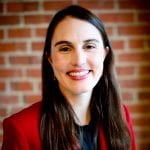OHC sponsors participants for podcasting institutes
The National Humanities Center’s (NHC) five-day virtual podcasting institutes provide hands-on, immersive training for PhD students and college faculty in the humanities and humanistic social sciences to translate research, commentary, and community-engaged narratives into podcast episodes. This year’s institute “Storytelling for a Modern Age” will take place January 8-12, 2024 for graduate students, and June 10–14 for faculty members. The OHC is providing institute tuition for one graduate student and two UO faculty members. The OHC will accept applications for future NHC podcasting institutes each fall.
 Kisa Clark, PhD candidate in Communications and Media Studies at the School of Journalism and Communication, will attend the NHC Graduate Student institute in January. After gaining podcasting skills, she and Kristin Yarris, associate professor of Global Studies and Global Health, along with the Community Partnership Program of Lane County Public Health plan to develop a podcast “Community Voices for Health Justice.” The podcast will tell the story of how community-based health advocacy organizations in Oregon responded to the public health emergency of the COVID-19 pandemic, and how they are implementing lessons learned from the pandemic response to address fundamental social drivers of health inequities moving forward. This podcast will help add voices to the discourse in health justice efforts. Clark and Yarris hope to add depth and understanding to contemporary public health equity efforts that are applicable to a range of potential audience members. They hope to develop companion teaching materials to use the podcast in classroom settings and plan to host it on a public streaming platform.
Kisa Clark, PhD candidate in Communications and Media Studies at the School of Journalism and Communication, will attend the NHC Graduate Student institute in January. After gaining podcasting skills, she and Kristin Yarris, associate professor of Global Studies and Global Health, along with the Community Partnership Program of Lane County Public Health plan to develop a podcast “Community Voices for Health Justice.” The podcast will tell the story of how community-based health advocacy organizations in Oregon responded to the public health emergency of the COVID-19 pandemic, and how they are implementing lessons learned from the pandemic response to address fundamental social drivers of health inequities moving forward. This podcast will help add voices to the discourse in health justice efforts. Clark and Yarris hope to add depth and understanding to contemporary public health equity efforts that are applicable to a range of potential audience members. They hope to develop companion teaching materials to use the podcast in classroom settings and plan to host it on a public streaming platform.
 Michael Allan, associate professor of Comparative Literature, and 2023–24 OHC Faculty Research Fellow plans to generate a podcast companion to the journal Comparative Literature featuring interviews with authors and special issue editors. Founded in 1949 at the University of Oregon, Comparative Literature is a key platform for the field with a quarterly publication, serves as a formal connection to the American Comparative Literature Assocation, and provides involvement for UO faculty and graduate students. Allan has been consulting with the journal’s publisher at Duke University Press about the possibility of beginning a podcast. The experience at NHC’s institute will provide a framework to spur the plan. Allan plans to involve the journal’s interns in the operational side of podcasting. The skills learned at the Institute will help Allan translate his editorial values across platforms, and he hopes to carry this lesson into the classroom and the UO’s Comparative Literature graduate program.
Michael Allan, associate professor of Comparative Literature, and 2023–24 OHC Faculty Research Fellow plans to generate a podcast companion to the journal Comparative Literature featuring interviews with authors and special issue editors. Founded in 1949 at the University of Oregon, Comparative Literature is a key platform for the field with a quarterly publication, serves as a formal connection to the American Comparative Literature Assocation, and provides involvement for UO faculty and graduate students. Allan has been consulting with the journal’s publisher at Duke University Press about the possibility of beginning a podcast. The experience at NHC’s institute will provide a framework to spur the plan. Allan plans to involve the journal’s interns in the operational side of podcasting. The skills learned at the Institute will help Allan translate his editorial values across platforms, and he hopes to carry this lesson into the classroom and the UO’s Comparative Literature graduate program.
 Hannah Cutting-Jones, a food historian and director of the Food Studies Program at UO plans to produce “Grounded: A Plant-based Podcast” after attending the June institute. Her classes (History of Vegetarianism, World History of Food, Philosophy of Food, To eat or not to eat? Humans & Animals, the Protein Wars, Intro to Food Studies, Taste of Power: Food and Colonialism, Long Lived: What we can learn from the Blue Zones, etc.) present fascinating options for podcast episodes. Cutting-Jones would like to create several episodes on the long history of vegetarianism as a key part of social, religious, and political movements. She plans to incorporate issues such as sustainability, justice, the intersections of art, gender, and race in food spaces, and how food-related projects can impact efforts to slow climate change into podcast episodes. In recent research and writing projects Cutting-Jones explores the impact of Christianity and colonialism on foodways in the Pacific; links between settler colonialism, beef production, and climate change; and analyzes our collective obsession with protein.
Hannah Cutting-Jones, a food historian and director of the Food Studies Program at UO plans to produce “Grounded: A Plant-based Podcast” after attending the June institute. Her classes (History of Vegetarianism, World History of Food, Philosophy of Food, To eat or not to eat? Humans & Animals, the Protein Wars, Intro to Food Studies, Taste of Power: Food and Colonialism, Long Lived: What we can learn from the Blue Zones, etc.) present fascinating options for podcast episodes. Cutting-Jones would like to create several episodes on the long history of vegetarianism as a key part of social, religious, and political movements. She plans to incorporate issues such as sustainability, justice, the intersections of art, gender, and race in food spaces, and how food-related projects can impact efforts to slow climate change into podcast episodes. In recent research and writing projects Cutting-Jones explores the impact of Christianity and colonialism on foodways in the Pacific; links between settler colonialism, beef production, and climate change; and analyzes our collective obsession with protein.